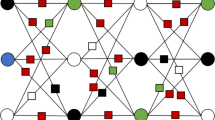Abstract
Blind quantum computation (BQC) allows quantum-limited clients to delegate their quantum-computing tasks to a remote quantum server while keep their inputs, outputs, and algorithms private during the computation. Secure multi-party computation aims to solve the problem of collaborative calculations among a group of distrustful participants. Although BQC has been used to solve the problem of secure two-party quantum computation, the case of multiple clients carrying out collaborative calculations has not been considered. In this paper, a quantum secure three-party computation protocol is proposed based on BQC, and the protocol is further extended to a quantum secure multi-party computation protocol. Using the blindness of BQC, the problem of privacy of clients’ data in quantum secure multi-party computation is solved. Moreover, in the preparation stage of the protocols, the initial states only need to be encrypted once, which is simpler than previous protocols.



Similar content being viewed by others
References
Shor, P.W.: Algorithms for quantum computation: discrete logarithms and factoring. In: Proceeding of the 35th Annual IEEE Symposium on Foundations of Computer Science, pp.124–134.IEEE (1994)
Grover, L.K.: A fast quantum mechanical algorithm for estimating the median. Phys Rev Lett. 79, 325–328 (1997)
Childs, A.M.: Secure assisted quantum computation. Quan Inf Comput. 5, 456–466 (2005)
Broadbent, A., Fitzsimons, J., Kashefi, E.: Universal blind quantum computation. In: Proceeding of the 50th Annual IEEE Symposium on Foundations of Computer Science, pp. 517–526.IEEE (2009)
Fitzsimons, J.F., Kashefi, E.: Unconditionally verifiable blind quantum computation. Phys. Rev. A. 96, 012303 (2017)
Zhang, X.Q., Weng, J., Li, X.C., et al.: Single-server blind quantum computation with quantum circuit model. Quantum Inf. Process. 17, 134 (2018)
Zhang, X.Q., Luo, W.Q., Zeng, G.Q., et al.: A hybrid universal blind quantum computation. Inf. Sci. 498, 135–143 (2019)
Sato, G., Koshiba, T., Morimae, T.: Arbitrable blind quantum computation. Quantum Inf. Process. 18, 370 (2019)
Dunjko, V., Kashefi, E., Leverrier, A.: Blind quantum computing with weak coherent pulses. Phys. Rev. Lett. 108, 200502 (2012)
Li, Q., Chan, W.H., Wu, C.H., et al.: Triple-server blind quantum computation using entanglement swapping. Phys. Rev. A. 89, 040302 (2014)
Takeuchi, Y., Fujii, K., Ikuta, R., Yamamoto, T., Imoto, N.: Blind quantum computation over a collective-noise channel. Phys. Rev. A. 93, 052307 (2016)
Sheng, Y.B., Zhou, L.: Blind quantum computation with a noise channel. Phys. Rev. A. 98, 052343 (2018)
Morimae, T., Fujii, K.: Blind quantum computation protocol in which Alice only makes measurements. Phys. Rev. A. 87, 050301 (2013)
Barz, S., Kashefi, E., Broadbent, A., Fitzsimons, J.F., Zeilinger, A., Walther, P.: Demonstration of blind quantum computing. Science. 335, 303–308 (2012)
Greganti, C., Roehsner, M.C., Barz, S., et al.: Demonstration of measurement-only blind quantum computing. New J. Phys. 18, 013020 (2016)
Huang, H.L., Zhao, Q., Ma, X.F., et al.: Experimental blind quantum computing for a classical client. Phys. Rev. Lett. 119, 050503 (2017)
Yao, A.C.: Protocols for secure computations. In: Proceeding of the 23rd Annual Symposium on Foundations of Computer Science, pp.160–164.IEEE (1982)
Yao, A.C.: How to generate and exchange secrets. In: Proceeding of the 27th Annual Symposium on Foundations of Computer Science, pp.162–167.IEEE (1986)
Yao, A.C.: Security of quantum protocols against coherent measurements. In: Proceeding of the 27th Annual ACM symposium on Theory of Computing, pp.67–75.ACM (1995)
Dupuis, F., Nielsen, J.B., Salvail, L.: Secure two-party quantum evaluation of unitaries against specious adversaries. Lect. Notes Comput. Sci. 6223, 685–706 (2010)
Kashefi, E., Wallden, P.: Garbled quantum computation. Cryptography. 1, 6–35 (2017)
Sun, Z., Li, Q., Yu, F., Chan, W.H.: Application of blind quantum computation to two-party quantum computation. Int. J. Theor. Phys. 57, 1864–1871 (2018)
Zhu, Y.Q., Li, Q., Liu, C.D., et al.: Secure two-party computation based on blind quantum computation. Int. J. Theor. Phys. 59, 2074–2082 (2020)
Lv, S.X., Jiao, X.F and Zhou, P.: Multiparty quantum computation for summation and multiplication with mutually unbiased bases. Int. J. Theor. Phys. 58, 2872–2882 (2019)
Shi, R.H., Mu, Y., Zhong, H., Cui, J., Zhang, S.: Secure multiparty quantum computation for summation and multiplication. Sci. Rep. 6, 19655 (2016)
Song, X.L., Gou, R., Wen, A.: Secure multiparty quantum computation based on Lagrange unitary operator. Sci. Rep. 10, 7921 (2020)
Acknowledgments
This project was supported by the National Natural Science Foundation of China (Grant No. 61601358).
Author information
Authors and Affiliations
Corresponding author
Additional information
Publisher’s Note
Springer Nature remains neutral with regard to jurisdictional claims in published maps and institutional affiliations.
Rights and permissions
About this article
Cite this article
Qu, GJ., Wang, MM. Secure Multi-Party Quantum Computation Based on Blind Quantum Computation. Int J Theor Phys 60, 3003–3012 (2021). https://doi.org/10.1007/s10773-021-04902-0
Received:
Accepted:
Published:
Issue Date:
DOI: https://doi.org/10.1007/s10773-021-04902-0




